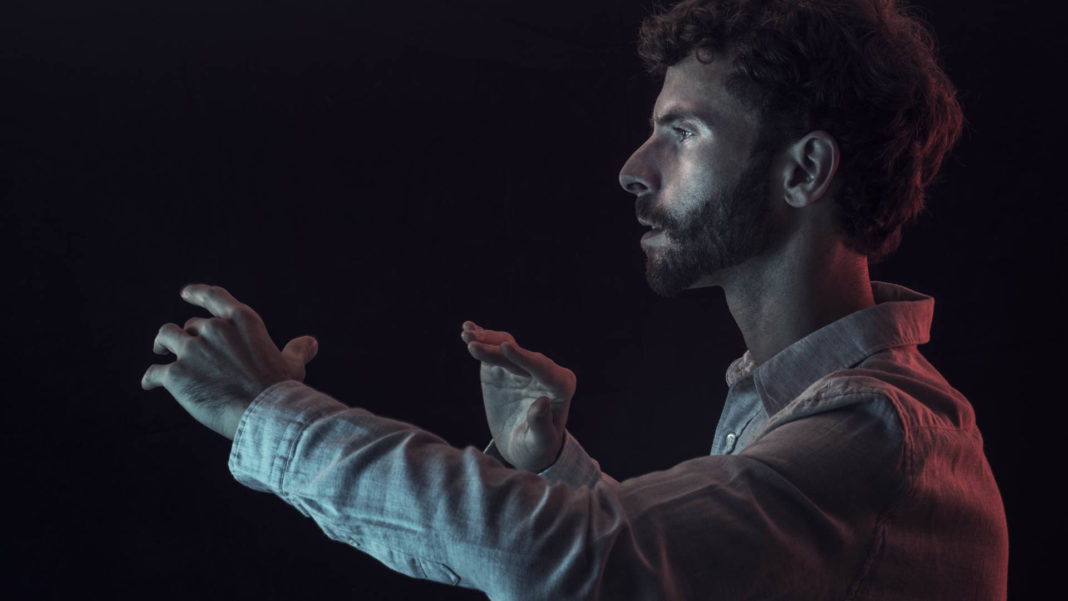It’s a busy time for 28-year-old Matthew Aucoin. He is currently Artist-in-Residence with LA Opera. He also has been composing works for several years including Evidence,which had its world premiere performance by the LA Chamber Orchestra in 2016. His other works include pieces written for solo violin and a piano concerto. He’s set to premiere a new opera with LA Opera in the near future. Next week there will be two concert performances of his opera Crossing at the Wallis Annenberg Center for the Performing Arts in Beverly Hills that he will be conducting.

First up on his schedule is conducting Rigoletto for LA Opera. Performances began on Saturday, May 12thand continue through June 3rdat the Dorothy Chandler Pavilion. I recently spoke to Aucoin about Rigoletto and his work as a conductor and his unique after-parties that occur at the conclusion of select opera performances.
You relocated to Los Angeles a couple years ago. You told me then that you “sensed a hunger for new work in Los Angeles.” Has the city and its institutions lived up to your expectations?

Photos by Craig T. Mathew/Mathew Imaging
Definitely. My role at LA Opera is so wonderfully amorphous. Sometimes I’m conducting Philip Glass [Aucoin conducted the 2016 LA Opera production of his Akhnaten]or Verdi, as I am this spring with Rigoletto. Other times I’m working with the artists, coaching them, doing concerts all around the country. Sometimes I’m just writing. They have embraced my writing a big piece for them in my role in the company. I’m still pinching myself that my work there is a good fit for them. I hope it will continue.
Is there something new to discover in Rigoletto? The opera had its debut in 1851. Is there a way to reinterpret classical material?
I could give you the easy answer which is that the Duke’s manipulation has a lot of resonance in the #Metoo moment. But that feels easy. For me, Verdi in particular is interested in these very primal aspects of who we are as human beings. His characters are, how to put it, they don’t come with a backstory. They are not well rounded the way that modern characters are supposed to be. They are archetypes. He’s the best there ever was at burning the core of this archetype into the character and the music.

The Duke is 100% this careless libertine. Gilda is just lost from the get-go. Fragile, full of feelings that she has no outlet for. She’s so sad and so doomed. Rigoletto is this seething mass of rage and guilt. What’s so touching is it is all love that has been misdirected. You can feel in the power and beauty of the music for Rigoletto that he could have been a loving, openhearted person. But all his passion has been twisted around and forced to stew in its own juices. I think you can set the piece in any century or culture and this kind of archetypal essence would remain intact. And it is that that I’m most interested in getting at as a conductor.
What role have the After Hours: A Musical Nocturne events played in expanding the appreciation for younger audiences and how will those events (on May 19thand June 3rd) reinvent what an opera experience can be?
I’m glad you mentioned the After Hours. I really enjoy that series. I’ve been heartened to see how full the room always is at the After Hours events and that there’s a healthy sprinkling of younger faces when we do it.

To your larger question, I think LA Opera is moving in a couple different directions at once. Both [General Director] Plácido Domingo and [conductor] James Conlon are great artists who work within a particular operatic tradition. What James is doing is really working to deepen and raise the standard of performance of core repertory pieces at LA Opera.

That might sound conservative, but given the company was only founded in the 1980s and doesn’t have the 150-year history say that the Metropolitan Opera does, really instilling a sense of the Verdi and Mozartian or whatever style into the bones of the orchestra and chorus and company as a whole, that is important work.

At the same time [President and CEO] Christopher Koelsch and I are working to expand the definition of what LA Opera does by doing a piece like Akhnaten, a piece like Crossing in all kinds of alternative venues such as the Ace Hotel where I did Nosferatu and we’re going back next year. I do think it’s possible to move in both directions at once. One thing that’s great about LA Opera is the big pieces have a home at the Dorothy Chandler Pavilion and we can do whatever else we want elsewhere in the city.
Next week we will have part 2 of our interview with Matthew Aucoin in which he talks about Crossing, his opera about part of poet Walt Whitman’s life during the American Civil War.











